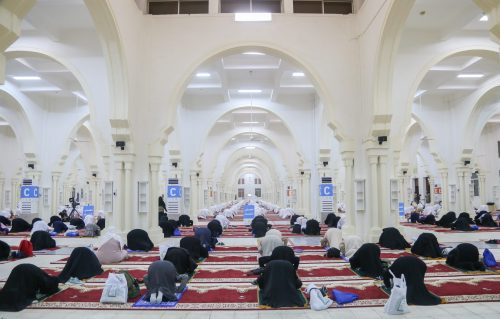The Group of Seven (G7) the club of the richest countries in the world, met Monday in France to discuss their affairs and peep into the affairs of other countries. As the United States (US), Germany, France, United Kingdom, Japan, Italy, and Canada wined, dined and decided the fate of the world, they invited five African countries: Rwanda, Senegal, Burkina Faso, Egypt and South Africa to observe on behalf of Africa and seep some wine.
The G7, which became G8 in 1998 when Russia was admitted, expelled Russia in 2014 over the Ukraine crisis and reverted to its hold status. It is truly a power house of the world with the seven countries representing over 62 per cent of the global net wealth of $280 Trillion. They are the leading exporting countries, largest nuclear energy producers, have the largest gold reserves and are the top contributors to the United Nations budget.
At their meeting, as usual, they took unilateral decisions and made magisterial declarations without consulting other humans. For instance they declared: “The G7 wants to overhaul the World Trade Organization in order to more efficiently protect intellectual property, solve disputes more quickly and stop unfair practices.” Although the WTO is made up of 164 countries, the words of these seven, is virtually law. But when over-fed, rich and powerful people like the G7 talk about reforms, things are about to get worse for the poor.
Intellectual Property Rights are supposed to be rights given to persons for the products of their minds or intellect. In the WTO, it is referred to as the “Trade-Related Intellectual Property Rights (TRIPS) So on the surface, there is nothing wrong, but in practice, it is a way the rich and powerful countries deprive others of their traditional or societal rights and appropriate them for profit.
For instance, while the widely grown Dongoyaro tree in Nigeria is medicinal and used for the effective treatment of malaria, an American, German, French or Briton can go patent it with the WTO and seek to stop Nigerians from using it to manufacture drugs on the basis that having first registered it, the Dongoyaro has become his ‘intellectual property’. So, anybody who wants to use it especially to manufacture drugs, must take permission from him and pay some fee.
The war between the rich and poor countries over intellectual property rights has been raging for over two decades after the former lost huge profits in the HIV/AIDS case. It was a question of what happens if intellectual property rights conflict with the right to life? In the HIV/AIDS case, there were 24 million sufferers in the world, there were drugs that could stop them from dying, but the drug manufacturers who had the patent, wanted to make a kill by charging prices that were unaffordable to the main suffers. The drug companies were backed by the rich countries. So people were dying like flies.
In 1986, AZT (azidothymidine ) manufactured by Burroughs Wellcome in the United States was the only anti-HIV drug available and it was sold for $8,000 per patient a year. In 1991, an Indian researcher, Rama Rao developed a chemical synthesis of AZT and Dr. Yusuf Hamied of the Indian Cipla company manufactured it crashing the cost of the drug to $730 per patient a year! It of course violated so called intellectual property, but it was saving millions of lives.
Then a cocktail of three drugs; stavudine, lamivudine, and nevirapine (HAART) which was quite effective in controlling AIDS began to be manufactured by three transnational drug companies who made them available at $12,000 a year per patient. President Nelson Mandela of South Africa whose country was being ravaged by HIV/AIDS decided in 1997 that it was better to violate the intellectual property law by sourcing and producing chemical synthesis of the drugs than let his people die off. South Africa was sued to stop it from making the drugs available at cheap or affordable prices.
Dr. Hamied came up with plans to manufacture the cocktail of drugs at $800 a year per patient! He was also willing to sell the drugs to governments making bulk purchases at $600 a year per patient. To worsen matters for the rich companies, he was willing to make the technology available free for African countries willing to produce the drugs. Dr. Hamied in addition decided to provide free, nevirapine, the drug limiting transmission of HIV/AIDS from mother to child.
That was not the worse to come for the rich countries, later, he further reduced the cost of the AIDS cocktail by 50 percent; to $350 a year per patient. These were drugs being sold by the rich pharmaceuticals for an average $13,000 per patient per year.
The drug companies backed by the US, blocked and tried to stop him from making the drugs available to all who needed them to stay alive. This sparked international outrage and accusations that the rich was trying to carry out genocide against poor countries especially in Africa.
The transnational drug companies and their backers were forced to back-down. As a result, millions of lives have been saved. The G7 is not showing concern about health rights taking precedence over intellectual property rights.
French President Emmanuel Macron whose yearning to play the global leader had been constrained by the popular ‘Yellow Vests’ protests, was the star at the meeting. First, he was host. Secondly, he and his wife enraged Brazil to the extent that the Brazilian extreme right wing President, Jair Bolsonaro threatened to reject the G7’s $20 million aid to help fight the amazon fires raging in that country.
Also, Macron put Climate Change and environmental issues on the agenda to the discomfort of America, and might have further angered President Donald Trump by inviting and holding a meeting with Iranian Foreign Minister Javad Zarif on the sidelines of the summit.
The G7 discussed a wide range of issues from the ongoing US-China trade war, the protests in Hong Kong and Brexit. New British Prime Minister, Boris Johnson made his maiden appearance at the G7, and as his country’s leader, met his pal, Donald Trump. However, both disagreed on whether Russia should return to the club. While the latter was for a return, Boris opposed, and perhaps more for the March 4, 2018 Salisbury poison attack on former Russian spy and double agent, Sergei Skripal and daughter, Yulia Skripal.
As usual, there were marches on the meeting by a coalition of non-state actors including anti-globalisation activists, the ‘Yellow Vests’ and Basque separatists from Spain.
Water cannons and tear-gas were used to disperse them. Despite this, they fight on, so should the rest of humanity who are made to bear the burden of the G7 decisions.



